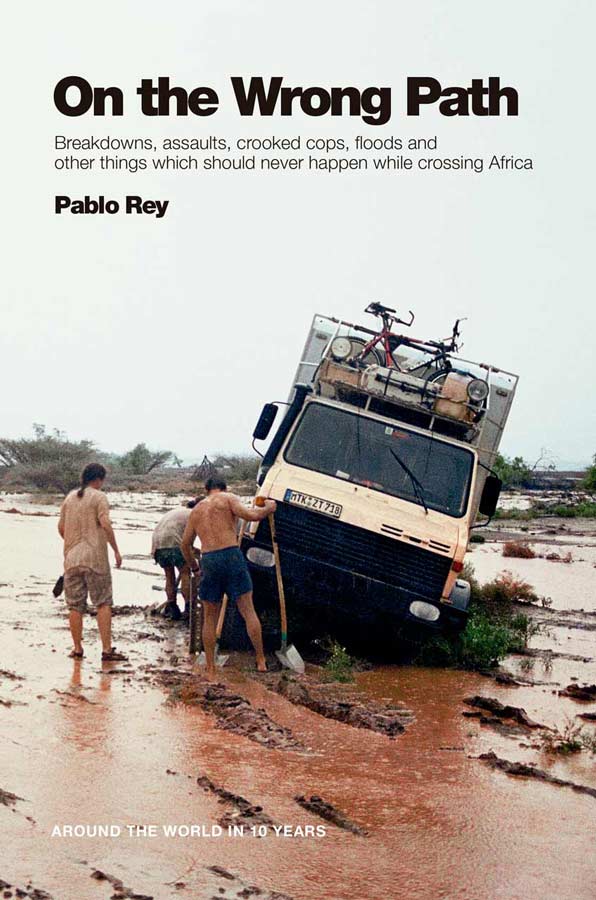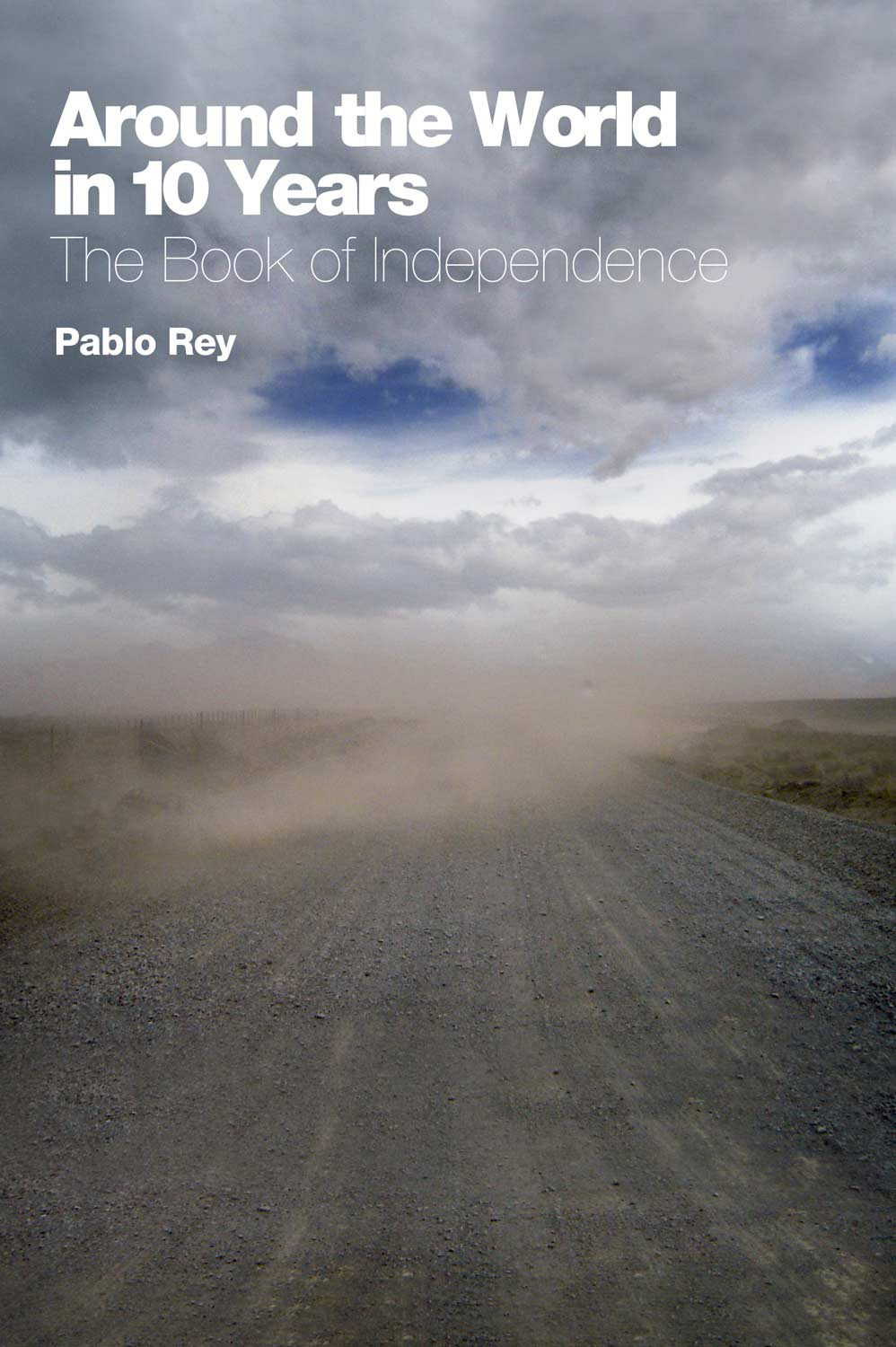290- How to avoid being eaten by a bear | EXPEDITION PORTAL
©Pablo Rey. Published at Expedition Portal website on August 28th, 2015.
.
HOW TO AVOID BEING EATEN BY A BEAR.
Traveling the world for more than 15 years, Pablo and Anna of Viajeros4x4x4 share their advice on how not to get eaten by a bear.
The usual way to scare off bears on North American hiking trails is by wearing a bell. Seriously, it sounds as if it may as well be a dinner bell. Tilin-tilin! Here I am! Tilin-tilin! I’m fat and juicy! It’s absurd. Personally, I prefer to walk in the woods singing Austrian mountain songs. It’s creepier and less embarrassing.
“Do you know the best way to avoid being eaten by a bear?” Anna, my travel partner, asks right after scaring away my first bear by menacingly wielding a spoon and a metal mug, the one we use to drink coffee every the morning. The real Anna, the one with a sharp and slightly evil spirit, was resurfacing.
“To avoid being eaten by a bear you have to walk in a group… and run faster than the slowest person!”
Then, she looked past my shoulder and ran away.
There wasn’t a bear about to scratch my back behind me, but her reaction was sufficiently unexpected to make me feel nervous for a while. Let’s be honest here: Anna runs faster than I do. In the last 15 years on the road we’ve seen lots of wild animals. Llamas, bucks, truck drivers, snakes, bus drivers and some crocodiles in South America. Monkeys, sloths and taxi drivers in Central America. But carnivores able to use your fingers as toothpicks? Only in Africa and at the zoo.
That’s why, while devouring hundreds of kilometers along the green tunnel, the road to the Arctic in Western Canada, we started gathering some brochures on what to do in the event we encountered a bear during a hike. All of them recommend making noise while hiking. They all tell you to leave your food locked in your vehicle, or hanging from a rope on a tree branch at least 3 meters up and at some distance from the tree trunk. Then, they give you some practical advice which appears to be written by an undercover bear.
‘If you encounter a bear that comes towards you growling and salivating, keep calm. It might be stressed by your presence. Hold on.’
He-he. In a situation like this, the one who’ll be stressed is me. I’m not at the office, I’m in nature!

‘You have to stand up on a big rock or on a fallen tree and slowly move your arms up and down and to the sides while you speak in a soft and friendly tone of voice.’
Ey yo… everything’s ok. Duuuude. Peace and love. I’ll go my way, and you’ll go your way. Let’s pretend we haven’t seen each other… Understand? Do you speak English?
‘If the bear runs towards you, it is most likely a defensive charge to frighten you, and it will probably stop a few centimeters from your face. You have to hold your position. If you run away, it means you are scared. And if you are scared, you are prey.’
That’s it, just to make it clear who is the boss. Like in Africa, if you see a lion while walking in the jungle, you have to remain calm, stand still, and wait for it to leave. It works at noon, their lazy time. If you find one at dawn or at dusk, your only chance is to become invisible. You can try to influence it by saying ‘I’m a bush, I’m a bush and you don’t see me because I’m a plant, and you lions are not vegetarians…’
‘If the bear only wants to make it clear who’s the boss, you will be able to move slowly away. Never turn your back to it.’
Remember, you have a bear growling at a short distance, less than a meter away from you. You know it hasn’t brushed its teeth since its’ last meal. That must have been a long time ago. If you haven’t shit your pants yet, you’re my hero.
‘On the other hand, if the bear is looking at you and keeps its ears up, be ready to defend yourself.’
Yes, you keep an eye to its ears. If they are pointing to heaven, remember bears need protein, too. They hunt for cattle, goats, deer, elks and… what was your name, again?
‘In this case, you have to fight for your life. Your backpack will protect your back. You have to point the bear spray at the ground because bears run and charge on four legs. Pay attention to the wind direction.’
The bear spray! The wind! What pocket is my bear spray in?! The wind!
‘If you are not carrying bear spray and a black bear attacks you, hit its eyes. If a grizzly attacks you, play dead, let it shake you for a while until it gets bored and goes away.’
Yes. Yes. Play dead. Sure. Think of it as a giant soft Teddy Bear. In any case, you are likely going to die on the next 5 minutes of natural causes; a heart attack, for example.
Usually, when a bear hears you’re around (or sees your coffee mug), it will hide in the forest. We, human beings are the most dangerous animals in nature. If you are in its way, you have to allow room to let it pass. But if it’s hungry or feels you‘re a menace to it or its cubs, be prepared. Go back to page 1.
Go hiking in bear territory with someone that runs slower than you do.
••••
READ MORE PABLO AND ANNA REAL TRAVEL STORIES IN THIS LINK
••••


“The Book of Independence works its magic like a bellows on the embers of wanderlust, inspiring us to break away from the norm, to slow down and smell the proverbial roses… or cow or elephant dung. It’s not about what you’ll do after you retire, it’s about what you do before you die.”
Chris Collard, Chief Editor, Overland Journal Magazine

Pablo Rey (Buenos Aires) and Anna Callau (Barcelona) also known as #viajeros4x4x4, have been overlanding the world non stop since 2000 on a 4WD Delica van. They mastered the art of solving problems (breakdowns and police harassment, between them) in far away places, while enjoying their nomadic lifestyle.
They’ve been 3 years driving through Middle East and Africa, between Cairo and Cape Town; 7 years all around South America, and 7 years going to every corner of Central and North America. They crossed the Southern Atlantic Ocean in a fishing vessel, descended an Amazon river in a 6 log wooden raft, and walked with a swiss knife between elephants in wild Africa. On the last two years they started to travel by foot (Pyrenees mountains coast to coast, two months) and motorbike (Asia), with the smallest lugagge possible.
Pablo has written three books in Spanish (one translated in English), many articles to magazines like Overland Journal and Lonely Planet and both are in the short list of the most respected latino overlanders.
¿When will the journey end? It doesn’t end, the journey is life itself.







